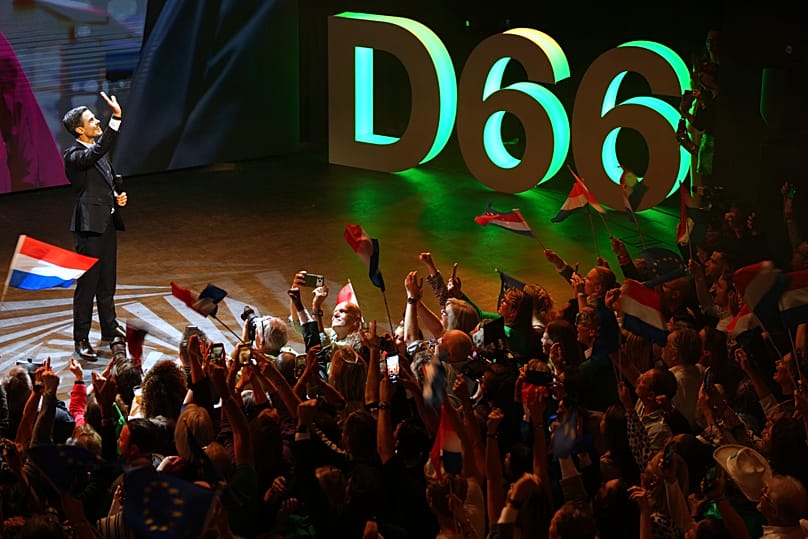The centrist liberal D66 has officially beaten the far-right Party for Freedom (PVV) and become the biggest winner of this week's nail-biting snap parliamentary election race.
With nearly all votes counted, Dutch press agency ANP announced that Geert Wilders' PVV no longer has a chance at overtaking the D66 led by Rob Jetten.
The remaining votes come from just one municipality, Venray, where a fire that broke out in the town hall delayed ballot counting. Also remaining are the mail-in ballots from voters living abroad, which will be announced by Monday. The latest tally shows a 15,155-vote lead for D66.
The D66 — short for Democrats 66, also named after the year the party was founded, 1966 — made significant gains, rising from just nine seats in parliament to 26.
According to ANP, which collects results from all Dutch municipalities, it is also possible that D66 will gain a residual seat, bringing its total to 27 MPs.
Their win means they will take the first initiative in forming a coalition, and puts Jetten as a likely candidate for prime minister.
Who is Rob Jetten and what does D66 stand for?
The liberal centrist party was last in government during the final term of former Prime Minister Mark Rutte, which fell in 2023 following a crisis regarding asylum.
Jetten himself served as minister for climate and energy policy in the last coalition under Rutte until 2024.
Jetten campaigned hard for a return to “progressive” politics, focusing on green energy to keep energy costs down, building cities to tackle the housing crisis and easing the strain on the healthcare system by prioritising illness prevention.
On the subject of housing, the centrist politician said he wanted to build 10 new towns, and that cutting red tape would allow 100,000 new homes a year to be completed.
Meanwhile, on the divisive issue of migration, Jetten pledged to spend more on integration programmes and to tackle illegal immigration by allowing asylum claims to be made from outside the EU.

How does Jetten hope to govern?
Jetten said his government’s policy would be to ensure that those fleeing war or violence participated in Dutch society by learning the language. He also promised that “the rotten apples” would be “pulled out of the system” and deported.
The D66’s leader also successfully took aim at Wilders, whose party quit the coalition last June over disagreements about migration, a move that brought down the government. Jetten accused his far-right opponent of “hijacking” Dutch identity and “sowing division”.
Jetten said on Wednesday night that he hopes to join a coalition in a “broad political centre”. That would point to a collaboration among the left-leaning GL-PvdA, the centrist CDA, and the more conservative VVD.
VVD, on the other hand, has expressed aversion to governing with Frans Timmermans of the GL-PvdA. After Timmermans stepped down following Wednesday’s lower-than-expected results in the exit poll, it remains unclear if this position would change.
The win for D66 also further isolates Wilders and limits his chances of governing. Most parties, including D66, have ruled out governing with PVV.







